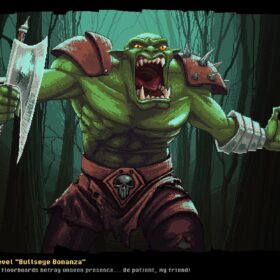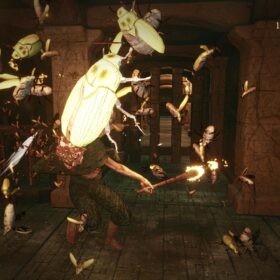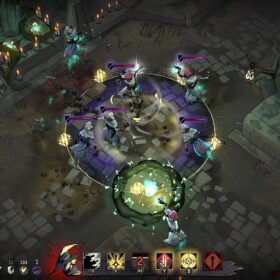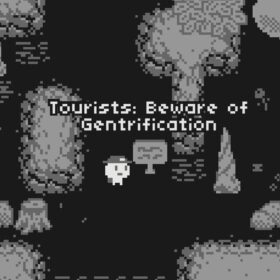

I really rather adore this. A Bewitching Revolution is an elegantly simple first-person adventure, in which you play a socialist witch. Living in a slightly cyber-punk city, she spreads her communist ideals through spells and tarot reading. Which at the very least isn’t a description of any other game ever made.
It is, apparently, based on the work Caliban And The Witch by Italian radical feminist Marxist Silvia Federici. (Which is a fact I only learned after playing, because I read the article RPS inevitably beat me to writing six months ago.) Developer Colestia interprets this as a literal witch’s revolutionising a city, turning its peoples against the state, with both non-violent and violent rebellion.

This plays out in this free (or pay as much as you can) game by walking around a small, multi-tiered city area, subverting through education. Along the way there’s some illegal tree planting (something we can all do literally today), destruction of advertising hoardings, and breaking and entering to rehouse the homeless.
The core of the game is finding people or groups who want their fortunes told. Through a pseudo-tarot reading, the Witch communicates overviews of Federici’s teachings, which then inspires those individuals to rebel against the current system. A restaurant becomes an outlet for free food, an employment office becomes an education centre. It’s cooommmMMMMMuuuunniissmmm!

What I personally liked most about this was the sense of reawakening parts of my brain left dozing since my 20s, when I would read Adbusters and graffiti street advertising hoardings. When I studied Paulo Freire at university, and could quote from Pedagogy Of The Oppressed. Because, yeah, capitalism is monstrous and if people could be educated to rise up and overthrow their oppressors, a socialist future would be far, far better for the masses. Meanwhile my mortgage.
Having never heard of Federici before, and being broadly ignorant on the entire topic, I was also immediately enamoured by the moments briefly talking about how capitalism doesn’t recognise childbirth as work. Let me reproduce them in full:
“Capitalism does not value labour which keeps people living and ready for work (cooking, cleaning, caring, childbirth).
But without this reproductive labour, capitalism would have no workers.
By collectively organising reproductive labour, we can refuse to work for the maintenance of capitalism.
We can build a world where there is more to life than making more workers.”
It also covers the idea of a future where “the absence of work brings us leisure, instead of poverty.” And perhaps most controversially, the notion that all prisoners are political prisoners. (Reminder: you are not required to agree with all new ideas in order to listen to all new ideas.)

This all works rather well as a game. That your actions bring about consequences is perhaps one of the defining aspects of “game” over other media, so this vignette is able to portray an idealistic vision of how education can bring about revolution. As Freire argued, true oppression means a population is unaware it is oppressed. Only through education can that change. Which of course raises the spectre of how one can educate from within without inadvertently becoming the new source of oppression. Here this is portrayed as the Witch arriving in town, doling out her radical ideas, and then leaving once the population is overthrowing their own oppressors.
It leaves it at that. Which I think works splendidly at communicating its own ideas, irrelevantly of which I agree with or argue against. And you know what’s absolutely not interesting when it comes to reimagining the potential of education? The person who says, “Oh yes but it can’t work because…” This game is a polemic, not a debate.

I’m disappointed that it uses tarot. Tarot is a tool used by con artists to trick the vulnerable and the desperate, the dreariest combination of astrology-like gibberish and cold reading bullshit. Tarot strikes me as a very peculiar choice, a self-parodying form of capitalism where the worker is required to pay for lies and deceit. In the end though, it’s really just another means for the game to deliver some political ideas, much as talking to any cat in the city delivers the same!
And that’s what this is! A little polemic with really pretty blocky graphics, exciting bits where the police get cross, and very well-educated cats.
It’s free on Steam, but if you want to be part of a collective that supports free art, you can also choose how much you want to pay for it on itch.io. You can also support Colestia on Patreon.
- Colestia
- itch.io, Steam
- Pay as much as you can
- Official Twitter
All Buried Treasure articles are funded by Patreon backers. If you want to see more reviews of great indie games, please consider backing this project.










































“A Bewitching Revolution is an elegantly simple first-person adventure, in which you play a socialist witch.”
Dammit, now I can’t not buy it.
Dammit, it’s even free.
Thanks for the recommendation! Will definitely check it out.
“I’m disappointed that it uses tarot. Tarot is a tool used by con artists to trick the vulnerable and the desperate, the dreariest combination of astrology-like gibberish and cold reading bullshit.”
Yikes…
Do you think the inclusion of Tarot cards has anything to do with it’s association with the Roma and the card’s purported role in practicing heretical acts of divination and Jewish mysticism during the Italian Inquisition? The cards were popular as playing cards at the time but allowed cultural practice without getting torched. Additionally, there’s also a lot of belief that Tarot circles during the salon era were bastions of feminist thought during the 18th and 19th centuries. I haven’t played the game yet but it seems like a clever use of the cards as a mechanic which appears to subvert authority.
I get your appreciation of rationalism but throwing such vitriol at tarot readers seems a bit much. I’m neither a believer nor a practitioner of tarot, but I know plenty of individuals who practice or participate in various forms of mysticism and divination both in good faith and as part of familial tradition. While divination and mysticism can spread misinformation, and even create an odd power dynamic at times; ultimately it’s a vis-a-vis transaction between two member of the proletariat in an immaterial cultural exchange. As with any other transaction like this YMMV, as some folk might not act in good faith. That said, I hope we can agree that diviners and mystics are certainly a lesser evil than societal scale cultural institutions of the first estate(both in the traditional sense and their modern day analogues) that both facilitate socioeconomic stratification and reinforce disparity.
Anyway, thanks for starting this blog, glad you still have a public outlet. Hope to contribute to your patreon once I’m done paying off some veterinary bills.
Cheers!
You are FAR better informed on this than me. Yes, those sound like good reasons for their inclusion.
However, I maintain my concerns about one of their contemporary uses, which is to con the desperate and vulnerable out of money in exchange for deceit.
Conning the desperate and vulnerable out of money is a contemporary use of pretty much _anything_. Just because something is or can be used to swindle people doesn’t mean that the thing is bad in itself, _especially_ under Capitalism.
Fantastic take.
For my part, the thing I appreciate about Tarot is that the meaning of cards is taken in aggregate, rather than individually. Surely that plays on the theme?
Great article, I want to give a different take to Bobbleprophet in that I fully agree with you! I feel much the same way about most forms of ritualised superstition, like religious faith. Hot take, I know. The tarot isn’t very harmful as people don’t tend to base their life around it, but it’s an enslavement of the mind we could do without.
I just want to mention though that this nonsense pre-capitalist roots, and aren’t founded in that economic systems. They’re as old as time. A famous example are oracles in Ancient Greece. In early Christian and Islamic texts (which I’m more familiar with, but there probably examples around the world), you can see them repeatedly being disgusted at the popularity and power these people amass, often framing them as knowing liars. I’d ask them to self-reflect and notice they’re much the same, but it shows that preaching this nonsense has existed since forever and will probably continue to, in one way or another.
“ I just want to mention though that this nonsense pre-capitalist roots, and aren’t founded in that economic systems. They’re as old as time. A famous example are oracles in Ancient Greece. In early Christian and Islamic texts (which I’m more familiar with, but there probably examples around the world), you can see them repeatedly being disgusted at the popularity and power these people amass, often framing them as knowing liars.”
Great point and an important one for this discussion. Why do you think mysticism and divination went from, at least, an accepted or, at most, integral part of culture in the Western World and Near East up until Abrahamic religions became political institutions? I think that it’s because mystics were individuals able to subvert authority by shifting the narrative from institutions dictating belief and societal order to an unstructured and organic interpersonal exchange of “belief”. How can you tax and tithe that?
Again I’m not advocating mysticism as a net benefit for society moving forward or saying this is a fundamental component of the human experience but rather that we should be cognizant of how established western/monotheist views on mystics is tainted by their role in subverting religious institutions that thrive off inequality. These cultural perceptions are ingrained to further marginalize disenfranchised and disadvantaged folk/classes, which only reinforces cultural chauvinism.
While rationalism and enlightenment philosophy are core components of socialist principles, if we hope to achieve an egalitarian future, we have to appreciate and try understand both the history and implications behind our cultural biases and why they exist .
I can provide a couple of book recommendations that, while not going into this particular topic directly at great length, do a great job of explaining social organization and cultural perceptions of “others”, “outsiders”, “barbarians”, etc which are largely interpreted under a socioeconomic lens from pre-history to the modern day.
Fantastic little game, thanks for the recommendation!
Wow just saw this post (and the excellent comments) now. Fascinating game. Thank you for bringing it to my attention.